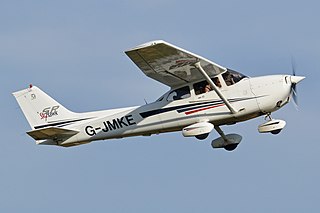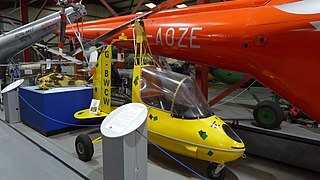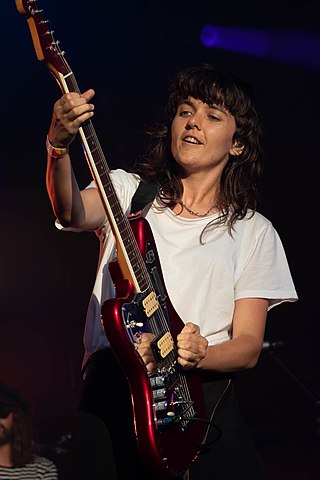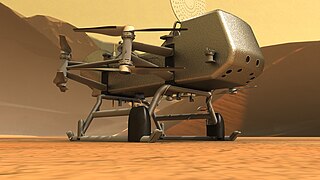
An aircraft is a vehicle that is able to fly by gaining support from the air. It counters the force of gravity by using either static lift or the dynamic lift of an airfoil, or, in a few cases, the downward thrust from jet engines. Common examples of aircraft include airplanes, helicopters, airships, gliders, paramotors, and hot air balloons.
An airport is an aerodrome with facilities for flights to take off and land. Airports often have facilities to store and maintain aircraft, and a control tower. An airport consists of a landing area, which comprises an aerially accessible open space including at least one operationally active surface such as a runway for a plane to take off or a helipad, and often includes adjacent utility buildings such as control towers, hangars and terminals.

The MBB/Kawasaki BK 117 is a twin-engined light utility–transport helicopter. It was jointly developed and manufactured by Messerschmitt-Bölkow-Blohm (MBB) of Germany and Kawasaki of Japan. MBB was later purchased by Daimler-Benz and eventually became a part of Eurocopter, which was later rebranded as Airbus Helicopters.

The Hughes OH-6 Cayuse is a single-engine light helicopter that was designed and produced by the American aerospace company Hughes Helicopters. Its formal name is derived from the Cayuse people while its "Loach" nickname comes from the acronym for the Light Observation Helicopter (LOH) programme that it was procured under.

The Sikorsky HH-52 Seaguard was an early amphibious helicopter designed and produced by the American helicopter manufacturer Sikorsky Aircraft. It was the first of the company's amphibious rotorcraft to fly.

The Helicopter Museum in Weston-super-Mare, North Somerset, England, is a museum featuring a collection of more than 80 helicopters and autogyros from around the world, both civilian and military. It is based at the southeastern corner of the former Weston-super-Mare Airport.

A gyrodyne is a type of VTOL aircraft with a helicopter rotor-like system that is driven by its engine for takeoff and landing only, and includes one or more conventional propeller or jet engines to provide forward thrust during cruising flight. During forward flight the rotor is unpowered and free-spinning, like an autogyro, and lift is provided by a combination of the rotor and conventional wings. The gyrodyne is one of a number of similar concepts which attempt to combine helicopter-like low-speed performance with conventional fixed-wing high-speeds, including tiltrotors and tiltwings.

A rotorcraft or rotary-wing aircraft is a heavier-than-air aircraft with rotary wings or rotor blades, which generate lift by rotating around a vertical mast. Several rotor blades mounted on a single mast are referred to as a rotor. The International Civil Aviation Organization (ICAO) defines a rotorcraft as "supported in flight by the reactions of the air on one or more rotors".

The Bell 533 was a research helicopter built by Bell Helicopter under contract with the United States Army during the 1960s, to explore the limits and conditions experienced by helicopter rotors at high airspeeds. The helicopter was a YH-40—a preproduction version of the UH-1 Iroquois—modified and tested in several helicopter and compound helicopter configurations. The Bell 533 was referred to as the High Performance Helicopter (HPH) by the Army, and reached a top speed of 274.6 knots in 1969, before being retired.

A helicopter is a type of rotorcraft in which lift and thrust are supplied by horizontally spinning rotors. This allows the helicopter to take off and land vertically, to hover, and to fly forward, backward and laterally. These attributes allow helicopters to be used in congested or isolated areas where fixed-wing aircraft and many forms of short take-off and landing (STOL) or short take-off and vertical landing (STOVL) aircraft cannot perform without a runway.

The AgustaWestland AW119 Koala, produced by Leonardo since 2016, is an eight-seat utility helicopter powered by a single turboshaft engine produced for the civil market. Introduced as the Agusta A119 Koala prior to the Agusta-Westland merger, it is targeted at operators favoring lower running costs of a single-engine aircraft over the redundancy of a twin.

The Aérospatiale SA 360 Dauphin was a single-engine French utility helicopter developed and produced by aerospace manufacturer Aérospatiale.

The Barnett J4B is a small gyroplane marketed in the United States by Barnett Rotorcraft for homebuilding. Originally flown as the J-3M with an open cockpit and fabric-covered sides, later versions have a fiberglass cockpit pod either partially or fully enclosing the pilot. Apart from the basic J4B, versions available in 2007 included the BRC540 and J4B2.

The Fairey Ultra-light Helicopter was a small British military helicopter intended to be used for reconnaissance and casualty evacuation, designed by the Fairey Aviation Company.

The Rotorcraft XR-11, known by the company as the X-2 Dragonfly, was an American two-seat lightweight helicopter built in the 1940s for evaluation by the United States Air Force by the Rotorcraft Corporation of Glendale, California.

Courtney Melba Barnett is an Australian singer, songwriter, and musician. Known for her deadpan singing style and witty, rambling lyrics, she attracted attention with the release of her debut EP I've Got a Friend Called Emily Ferris in 2012. International interest came with the release of her EP The Double EP: A Sea of Split Peas in 2013.

Tahliah Debrett Barnett, known professionally as FKA Twigs, is an English singer, songwriter, and dancer. Born and raised in Cheltenham, she became a backup dancer for numerous famous musicians after moving to London at the age of 17, and made her own musical debut with EP1 (2012).
The following lists relate to aviation:

Dragonfly is a planned spacecraft and NASA mission, which will send a robotic rotorcraft to the surface of Titan, the largest moon of Saturn. It would be the first aircraft on Titan and is intended to make the first powered and fully controlled atmospheric flight on any moon, with the intention of studying prebiotic chemistry and extraterrestrial habitability. It will then use its vertical takeoffs and landings (VTOL) capability to move between exploration sites.
















